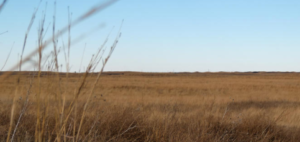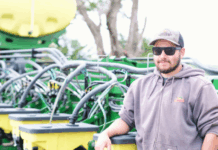According to Brian Grimmett, Kansas News Service. KINSLEY, Kansas — In the late 1980s, drought left the wells that supply water to the cities of Hays and Russell in western Kansas precariously low. The near-catastrophe sent city leaders on the hunt for more water.
“We were just trying to survive from one year to the next,” said Eber Phelps, former Hays mayor and city councilman.
The cities researched their options, including looking into purchasing water from several nearby reservoirs.
But ultimately in 1995, they bought the R9 Ranch in Edwards County about 70 miles south of Hays.
It looked like foresight. The two cities had locked in water rights that would allow them to grow in a relatively parched part of the world. It may yet prove to be just that — if years of fighting with the farming neighbors of the R9 end in a win.
Standing atop one of the sandy hills on the property, Hays City Manager Toby Dougherty pointed to the fading circle outlines of irrigated crop fields and explained how those fields are now being turned into native prairie.
“The most important aspect of this property wasn’t the 6,800 acres that was purchased by Hays and Russell,” he said. “It was the nearly 8,000 acre feet of water rights that came with it.”
For decades, the ranch remained an unused investment in water. But after several years of drought in the early 2010s, city leaders decided to cash in.
“We have pushed our existing sources to the max,” Dougherty said. “We don’t have a lot of years left for them to be considered viable.”
In 2015, the cities moved to change the water use permit tied to the ranch from irrigation to municipal use and get permission to pump the water across the state.
“This is a problem across the West that we know as ‘buy and dry,’” said Burke Griggs, a water lawyer and law professor at Washburn University. “You purchase the water right, you sever the water right from the land, and you dry that land up.”
He said the movement of water from rural areas to cities has been a longstanding drama in the West. It’s the source of lawsuits and deep resentments.
It’s usually legal, if nearly always controversial.
“Rural communities depend upon the added value of irrigation,” he said. “In western Kansas, an irrigated acre is worth two to three times what a dryland acre is.”
In Kansas, transfering water can be as simple as filing an application.
“What’s really important when we convert irrigation to any other beneficial use, is we apply a consumptive use factor,” said Lane Letourneau of the Kansas Division of Water Resources.
That “consumptive use factor” means that when someone uses water for irrigation, not all of it is used, or consumed, by crops. Some soaks back into the ground. But when you ship the water away — say, that 70 miles to Hays — none of it will return to the local system.
To make sure that kind of change doesn’t dry up the neighbors, the state limits how much can be pumped away.
In the R9 Ranch case, that’s the conflict.
The state’s consumptive use calculation found that the city would need to leave about 15% of its water on the ranch. But the state asked the two cities to leave behind even more to make sure the supply would still be going strong in 50 years.
The two cities eventually agreed to a 30% reduction in their water rights. Dougherty, the Hays city manager, said if they had been any other kind of business, the state would have applied the formula, they would have accepted it and everybody would have walked away without another word.
“Hays went over and above when they agreed to these numbers,” Letourneau said.
But even agreeing to the increased reduction wasn’t enough for some of the ranch’s neighbors.
Led by a group known as Water PACK that advocates for the water rights of farmers in central Kansas, the R9’s neighbors challenged the state’s order in court. It contends the state is still letting the cities pump away too much water.
“There is a number out there that is sustainable that would meet the needs of both parties,” said Water PACK President Kent Moore.
The group has been following the issue since shortly after Hays and Russell applied for the water use change in 2015. Moore said the group participated in the public information meetings and petitioned the state and local groundwater management district, but he said “I don’t really think it mattered a lot.”
Meanwhile, city leaders in Hays and Russell are getting impatient.
“If there’s going to be aquifer decline, it’s not us that’s going to cause it,” Dougherty said.
A ruling in the challenge will likely come within a few months.
If Hays and Russell win, the next step will be getting approval under the Kansas Water Transfer Act. That kicks in if water will be moved more than 35 miles. The Hays case will be the first-ever test of the law the legislature created out of fears that Wichita would begin to monopolize nearby reservoirs.
The outcome will likely have long-lasting consequences for the next city that goes looking to buy water in rural Kansas.
“There may be a political reaction to this, but water generally flows uphill to money,” Griggs said. “And that’s what we’re seeing here.”





